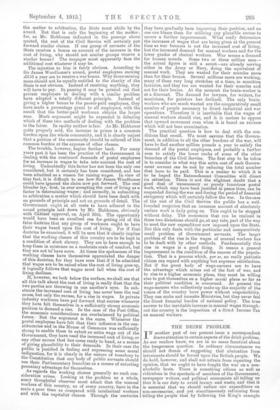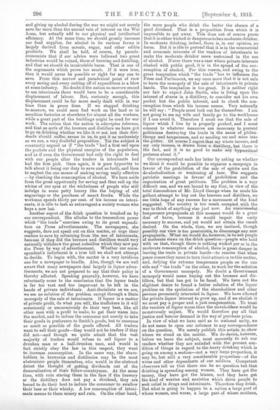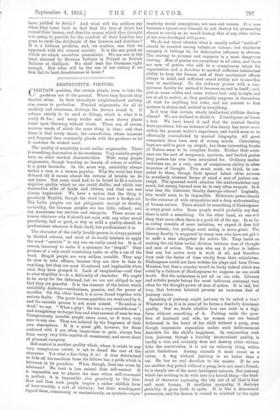THE DRINK PROBLEM.
IN another part of our present issue a correspondent draws attention to certain aspects of the drink problem. As our readers know, we are in no sense fanatical about the temperance question. In ordinary circumstances we should not dream of suggesting that abstention from intoxicants should be forced upon the British people. We do hold, however, and shall not refrain from repeating the opinion, that we ought to have fought the war on a non- alcoholic basis. There is something odious as well as ridiculous in the spectacle of members of the Government, newspaper writers, and political economists all telling us that it is our duty to avoid luxury and waste, and that it is essential that we should reduce our expenditure on non-necessaries, and yet simultaneously refraining from telling the people that by following the King's example and giving up alcohol during the war we might not merely save far more than the annual rate of interest on the War Loan, but actually add to our physical and intellectual efficiency. At the same time, we should greatly increase our food supplies, for alcohol in its various forms is largely derived from cereals, sugar, and other edible products. We shall be told, of course, by pseudo- economists that if our advice were followed two great industries would be ruined, those of brewing and distilling, and that we should do incalculable harm. That is one of the arguments which prove too much. If it were true, then it would never be possible or right for any one to save. From this narrow and paradoxical point of view every saving and every cutting off of expenditure is a blow at some industry. No doubt if the nation to-morrow ceased to use intoxicants there would have to be a considerable displacement of labour. But, curiously enough, this displacement could be far more easily dealt with in war time than in peace time. If we stopped drinking to-morrow, we could soon find work on the laud or in munition factories or elsewhere for almost all the workers, while a great part of the buildings might be used for war work. The notion that the nation is adseriptus taberrtae, and that as serfs of the brewers and distillers we have got to go on drinking whether we like it or not lest their divi- dends should suffer, seems to us, to put it as moderately as we can, a very doubtful proposition. Yet the subject is constantly argued as if " the trade " had a first call upon the pockets and the physical energies of the population, arid as if even the Government had only the right to deal with our people after the traders in intoxicants had had the first pick. Once again, it is pure hypocrisy to talk about it being our duty to save and so forth, and then to neglect the one means of making saving really effective —by checking the consumption of alcohol. We turn aside from the great opportunity for saving and then roll up the whites of our eyes at the wickedness of people who still indulge in some petty luxury like the buying of old engravings or the purchase of smart frocks. While the workman spends thirty per cent. of his income on intoxi- cants, it is idle to lash as extravagant a society woman who buys a new hat.
Another aspect of the drink question is touched on by our correspondent. She alludes to the tremendous power which "the trade" exercises owing to its great expendi- ture on Press advertisements. The newspapers, she suggests, dare not speak out on this matter, or urge their readers to save by refraining from the use of intoxicants, because if they did the brewers and distillers would very naturally withdraw the great subsidies which they now pay the Press by way of advertisement. Whether our corre- spondent's indictment is a true bill we shall not attempt to decide. To begin with, the matter is a very invidious one for a newspaper to handle. Also, though we are well aware that many newspapers deal largely in liquor adver- tisements, we are not prepared to say that their policy is thereby affected. Speaking generally, however, we have reluctantly come to the conclusion that the liquor trade is far too vast and too important to be left in the hands of private individuals. Anti-Socialists as we aro, we see no solution of the problem except through a State monopoly of the sale of intoxicants. If liquor is a matter of private profit, do what you will, the traffickers in it will consciously or unconsciously do their very best, like all other men with a profit to make, to get their wares into the market, and to induce the consumer not merely to take their goods in preference to Smith's goods, but to consume as much as possible of the goods offered. All traders want to sell their goods—they would not be traders if they did not—and though we quite admit that the vast majority of traders would refuse to sell liquor to a drunken man or a half-drunken man, and would in fact strictly obey the law in this respect, they want to increase consumption. In the same way, the share- holders in breweries and distilleries may be the most abstemious people themselves, who would in the abstract detest the thought of getting dividends out of the demoralization of their fellow-countrymen. At the same time, with ruin staring them in the face if the brewery or the distillery does not pay a dividend, they are bound to do their best to induce the consumer to swallow their beer or their whisky. A low consumption of intoxi- cants means to them misery and ruin. On the other hand, the more people who drink the better the chance of good dividend. That is a proposition from which it is impossible to get away. This does not of course prove that it is either wicked or dangerous tobe a moderate drinker. In moderate drinking, indeed, there is, in our opinion, no harm. But it is idle to pretend that it is in the commercial and economic interests of the vendors of intoxicants to make the moderate drinker more restrained in the use of alcohol. If ever there was a case where private interests clashed with public good, it is in the spread of the con- sumption of alcohol. For this reason, and owing to the great temptation which " the trade " has to influence the Press and Parliament, we say once more that it is not safe to leave the monopoly of the sale of intoxicants in private hands. The temptation is too great. It is neither right nor fair to expect John Smith, who is living upon the interest of shares in a distillery, to consider not his own pocket but the public interest, and to check the con- sumption from which his income comes. Very naturally he will say : " People must look out for themselves. I am not going to see my wife and family go to the workhouse if I can avoid it. Therefore I must see that the sale of liquor which I live by is properly pushed, and I must consent to whatever measures are necessary to prevent politicians destroying the trade in the name of philan- thropy and temperance, and so sending me and mine into the gutter. Of course I regret that my whole income, and my only income, is drawn from a distillery, but there is the fact, and it is no good to make any hypocritical pretence about it."
Our correspondent ends her letter by asking us whether we think it would be possible to organize a campaign in favour of the prohibition of the sale of spirits and the de-alcoholization or weakening of beer. She suggests patriotic meetings in favour of prohibition and the organization of great petitions. The problem is a very difficult one, and we are bound to say that, in view of the total discomfiture of Mr. Lloyd George when he made his gallant attempt to buy out the brewers and distillers, we see little hope of any success for a movement of the kind suggested. The country is too much occupied with the war to think of anything else just now. An unsuccessful temperance propaganda at this moment would do a great deal of harm, because it would impair the unity necessary to success, and yet would not obtain the result desired. On the whole, then, we aro inclined, though possibly our view is too pessimistic, to discourage any new propaganda. What we would do, however, is to ask people of moderate views on the drink question—people who hold with us that, though there is nothing wicked per se in the moderate consumption of alcohol, there is great danger in leaving the trade in private hands—to resolve that when peace comes they mean to turn their attention to this matter, and, defying the extreme temperance people on the one aide and " the trade " on the other, to work for the solution of a Government monopoly. No doubt a Government monopoly would mean buying out the brewers and dis- tillers, but that has got to be faced. We have not the slightest desire to found a better solution of the liquor problem on the spoliation of the shareholders and other persons pecuniarily interested in liquor. We have allowed the private liquor interest to grow up, and if we abolish it we must pay a proper and a just compensation. To treat the vendors of liquor worse than the slaveholders would be monstrously unjust. We would therefore pay all that justice and honour demand in the way of purchase price. In view of what we have said as to national unity, we do not mean to open our columns to any correspondence on the question. We merely publish this article to show where we stand on the matter. We do desi however, before A owever, before we leave the subject, most earnestly to ask our readers whether they are satisfied with the present con- dition of things in regard to the heavy drinking which is going on among a section—not a very large proportion, it may be, but still a. very considerable proportion—of the wives and other dependants of our soldiers. Competent observers tell us that there can be no question but that drinking is spreading among women. They have got the money, they have got the leisure, and they have got the kind of worries and anxieties which drive people to seek relief in drugs and intoxicants. Therefore they drink. But what is going to happen to a nation a large part of whose women, and worse, a large part of whose mothers, have yielded to drink ? And what will the soldiers say when they-come back to find that the lure of drink has ruined their homes, and that the money which they thought was going to provide for the comfort of their families has gone to swell the dividends of the brewers and distillers ? It is a hideous problem, and, we confess, one that we approach with the utmost anxiety. It is the one point on which we admit ourselves pessimistic. We are not in the least alarmed by Russian failures in Poland or British failures at Gallipoli. We shall beat the Germans right enough. But what will be the use of our victory if we first fail to boat drunkenness at home ?




































 Previous page
Previous page